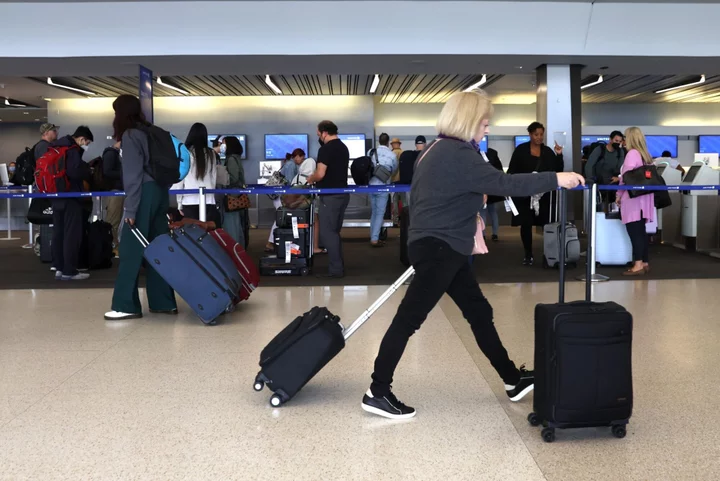
Americans Want Overseas Summer Vacations Despite Costs and Crowds
Long airport lines, jammed planes, higher fares and potential flight delays are set to plague the coming summer
2023-05-24 21:22
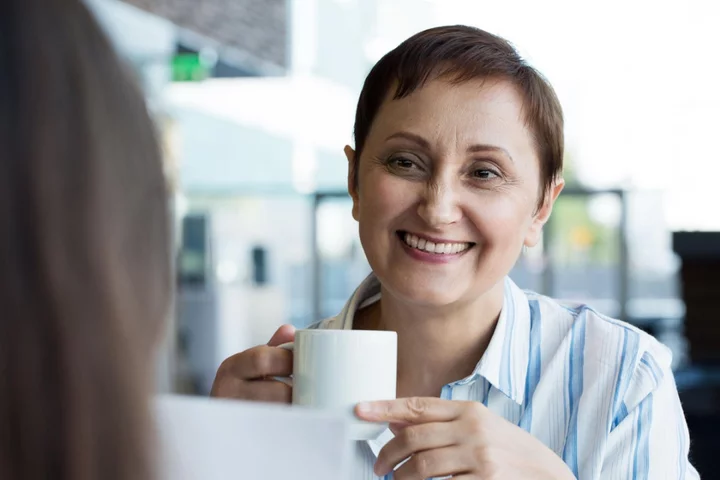
Menopause stigma still ‘rife’ in workplaces as women fear for their careers
Nearly half (44%) of women experiencing menopause symptoms ‘suffer in silence’ at work, due to fears it could negatively impact their career. In a bid to hide symptoms, 48% say they would lie about why they needed a sick day, rather than saying menopause was affecting them, and 39% are still embarrassed to talk about the topic at work, according to a new survey by Lime Solicitors. The law firm polled 1,001 women who are experiencing or have experienced menopause or perimenopause. The research, carried out in April, also found 60% of respondents think their workplace should offer more menopause support, and less than a third (29%) of the women surveyed said they would feel comfortable asking for adjustments to help support them with menopause symptoms. “Our research shows that almost half the of women surveyed think going through menopause will negatively impact their career, which is why so many women suffer in silence,” said Neha Thethi, head of employment at Lime Solicitors. “It appears employers are failing an important part of their workforce by not providing the necessary support or creating a positive culture whereby people can raise concerns or issues with confidence. “To help dispel the stigma around menopause and empower women to speak freely and honestly about their experiences, we need menopause champions in all workplaces,” Neha added. How can employers help? “Menopause is a simple fact of life, and very much a reality in the workplace,” Paula Allen, global leader of research and total wellbeing, and senior vice-president at TELUS Health, told PA Media. While there has been a big increase in menopause awareness in recent years – with a number of celebrities, such as Davina McCall, shining a light on the topic, there’s still progress to be made. “It isn’t paid much attention in the workplace as a health issue, and therefore is rarely managed in a way that is optimum,” she added. She said, “eradicating stigma and inaction starts with education” – which can include “wellbeing sessions on all aspects of women’s health, including menopause, and training of managers on how to support employees with health needs”. Dee Murray, CEO of Menopause Experts Group, agrees awareness training is a key part of the picture. “Women who experience menopausal symptoms in the workplace are likely to need some support, or at the very least signposting, when they most need help,” said Murray. “Making sure line managers are trained, or at least have some basic knowledge, is hugely important. It’s also important to remember that those managers too may be experiencing menopause symptoms, or will do at some stage, if they are female. “Menopause champions – just like mental health first aiders – have become a vital part of the workplace for many women,” Murray adds. “Champions allow women to feel safe speaking out about symptoms that may be causing them extra anxiety and challenges at work. “Far too many women still feel embarrassed about discussing symptoms, and they must feel secure in the knowledge that they will not become the butt of the office jokes or judged about their symptoms, which can often be debilitating and very personal.” Workplace adjustments Allen said: “The good news is that even though menopause is a noteworthy health issue, the support needed from a workplace point of view can be quite simple. For example, menopause can cause drastic changes in body temperature, which can be addressed with fans, or by offering desks with windows or air conditioning vents close by. “Symptoms of menopause may also include insomnia, irritability and depressive symptoms, all of which have a physical base but can impact behaviour and mental wellbeing. With this, employees should take advantage of the personal support offered by their workplace through their Employee Assistance Program (EAP) and their Telemedicine provider if available.” A flexible approach Murray notes that flexible working can be an effective adjustment too. “Employers who offer flexible working hours and remote working will benefit in the longer term. Firms with Menopause Approved status find they have better retention of staff and are more competitive when it comes to recruitment too,” she said. “Those experiencing menopause are not always seeking special treatment, just acknowledgement and support to help them through what can be a tricky time.” Read More Charity boss speaks out over ‘traumatic’ encounter with royal aide Ukraine war’s heaviest fight rages in east - follow live Signs and symptoms of breast cancer as Amy Dowden reveals diagnosis Helen Flanagan says she spent her 20s ‘pregnant and breastfeeding’ Baby food and drink guidelines needed over sugar concerns, say health campaigners
2023-05-24 19:59

Signs and symptoms of breast cancer as Amy Dowden reveals diagnosis
Strictly Come Dancing professional dancer Amy Dowden has revealed she has been diagnosed with breast cancer. Caerphilly-born Dowden, who joined the BBC dance competition show in 2017, shared the news on Instagram, telling fans that she is “determined” to return to the dance floor as soon as she can. The 32-year-old wrote: “Hey all, I’ve got some news which isn’t easy to share. I’ve recently been diagnosed with breast cancer but I’m determined to get back on that dance floor before you know it.”Maldives Dowden went to the GP after realising the lump had grown after her holiday. Last week she was diagnosed with stage three breast cancer. She told Hello Magazine: “My doctor explained to me that there are three grades, and three is the most aggressive, but they feel like they’ve caught mine early and to not be too alarmed because grade three would be expected in somebody of my age. “You just don’t ever think it’s going to happen to you. I hadn’t thought it was possible to get breast cancer at my age. “My mum has had breast cancer, but she had it at a later age, in her 50s.” What are the signs to know? Many women know that a lump can be a possible symptom of breast cancer, but there are other signs of the disease to look for,” says Manveet Basra, head of public health and wellbeing at Breast Cancer Now. “While most breast changes, including lumps, won’t be cancer, it’s important to contact your GP as soon as possible if you notice a change to your breast that’s new or unusual for you, as the sooner breast cancer is found, the more successful treatment is likely to be.” Clare O’Neill from CoppaFeel!, wants everyone to be breast aware, “Because people of all ages and genders have breast tissue”, she says. She recommends checking your breasts or pecs once a month, while adding: “It can be normal to have pain and lumps around the time of your period.” So what symptoms other than lumps should you be aware of? If you see “any puckering, thickening, dimpling or rash of the skin, talk to your doctor”, advises O’Neill. “Also talk to your doctor if you notice a change in direction of the nipple or any bleeding or discharge from the nipple, or swelling of the chest or armpit. Breast awareness is not supposed to be scary, it’s about empowering people to know their bodies.” How to check your breasts “Checking your breasts only takes a few minutes. It could be when getting dressed, when showering or putting on moisturiser,” says Basra. “It’s important to remember to check your whole breast area, your armpits and up to your collarbone (upper chest) for changes. There’s no special technique, it’s as simple as TLC: Touch, Look, Check.” See your GP if you have any worries about possible symptoms, and you can call Breast Cancer Now’s free helpline on 0808 800 6000. Read More Charity boss speaks out over ‘traumatic’ encounter with royal aide Ukraine war’s heaviest fight rages in east - follow live Helen Flanagan says she spent her 20s ‘pregnant and breastfeeding’ Baby food and drink guidelines needed over sugar concerns, say health campaigners Period advice now being offered by Amazon’s Alexa
2023-05-24 19:19

Strictly Come Dancing star diagnosed with breast cancer aged 32
Professional dancer Amy Dowden has revealed that she has been diagnosed with breast cancer. The Strictly Come Dancing star, 32, said she received the diagnosis “last week” and described it as “another hurdle” in her life. Speaking to Hello!magazine, Dowden said: “I’ve been through quite a lot in my life and this is another hurdle. “But if I’m positive and strong, I’ve got a really good chance of getting back out on the dance floor as soon as possible.” Dowden also suffers from Crohn’s disease, a lifelong condition where parts of the digestive system become inflamed. She campaigns for awareness around Crohn’s and released a BBC documentary Strictly Amy: Crohn’s and Me about living with the disease in 2020. She pointed towards her work around raising awareness of Crohn’s and said she hopes to “do the same” with breast cancer. “If I can try to turn this negative into a positive, it’s going to help me get through this,” she added. The dancer, who married her partner Ben Jones in South Wales last July, continued: “You just don’t ever think it’s going to happen to you. I hadn’t thought it was possible to get breast cancer at my age.” She revealed that her mother has also had breast cancer in the past, but she was diagnosed in her fifties. According to Cancer Research UK, there are around 55,900 new breast cancer cases in the country every year, with around 5,000 women under the age of 45 diagnosed. Around eight in 10 (80.6 per cent) of women in England who are diagnosed between the ages of 15 and 44 survive breast cancer for 10 years or more, data from the organisation shows. Dowden said she only began making a “conscious effort” to check her breasts for signs of cancer after taking part in CoppaTrek! With Gi, a fundraising walk led by blogger and podcaster Giovanna Fletcher for breast health charity CoppaFeel! She credited the charity with “potentially [saving] my life”, adding: “I don’t know how long this lump could have been there before I would have noticed and done something about it.” The dancer added that she hoped speaking about her diagnosis “might end up saving some other people’s lives” if she prompts them to check their breasts. She first found a “hard lump” in her right breast in April, a day before she and Ben were due to fly to the Maldives for a delayed honeymoon. Dowden said she was “in shock” and initially thought the lump could have been “period-related” or something else, but decided to “keep an eye on it”. After returning from holiday, Dowden said she realised the lump “felt so much bigger” while preparing to do a dance show with her husband and decided it was time to see her GP. She was sent for an emergency referral. Dowden’s doctors believe the cancer was discovered early, but she is still awaiting more information before getting a full treatment plan, which “will definitely include surgery”, she said. “I don’t know what stage the cancer is yet, until I have an MRI scan and a biopsy on a second lump they have found in the same breast,” she explained. “Once they’ve got that, they can give me a full prognosis.” Posting on Instagram after her interview was published this morning (Wednesday 24 May), Dowden told her followers: “Hey all, I’ve got some news that isn’t easy to share. I’ve recently been diagnosed with breast cancer but I’m determined to get back on that dance floor before you know it. Welsh love Amy.” Read More Breast cancer symptoms you should look out for Start mammograms at 40, not 50, a US health panel recommends Angelina Jolie shares tribute to late mum and urges women with family cancer history to get checked
2023-05-24 18:55

The secret side of Turkey's Aegean coast
Far from the crowds of Bodrum and Alaçatı, Turkey's Aegean coast is home to historic beach towns and idyllic islands. Ayvalık, famous for its olive oil mills, is one of the prettiest -- and nearby island Cunda makes for a perfect twin-center break.
2023-05-24 18:54

Helen Flanagan says she spent her 20s ‘pregnant and breastfeeding’
Helen Flanagan admits she’s “no superwoman”, and isn’t saying being a single parent is easy. But despite “running around like a blue-arsed fly” as she puts it, the former Coronation Street actress, who split from her footballer fiancé Scott Sinclair last summer, says her new single family life is working really well. “I co-parent with my ex-fiancé Scott – we’ve got three children together, and we were together for 13 years,” explains Flanagan, 32, who has just appeared on I’m A Celebrity… South Africa. “My friends help me with the children, because I do work nearly every day. I have a friend and we’re a girl gang together – I’m not superwoman! So that works nicely at home. “Scott’s living with his mum at the moment in Bristol, and my children are really close to their nana, so it works really well. My kids just have a really happy environment, with me and my friend at home, and then they have a really nice happy environment with their dad and their nana.” Flanagan, who lives in Manchester, says she has the children – Matilda, eight, Delilah, five, and two-year-old Charlie – “the majority of the time”, as their dad’s away playing football for Bristol Rovers a lot. “So it kind of can’t be helped, really,” she says. “But his mum is absolutely fantastic, we get on very, very well. She’s known me since I was 19, so I’m close with his mum, and she helps me a lot with the children.” The actress admits that although she misses her “babies” when they’re with their dad and nana, she makes the most of her child-free time. “I had my children not young, but young-ish – I had Matilda when I was 24 – and I just feel like I spent all my 20s being pregnant and breastfeeding at home,” Flanagan reflects. “So it’s kind of nice sometimes to have that time, because I know they’re in the best hands with Scott’s mum, and it’s lovely that I can spend some time with my friends and concentrate on my work and have some fun. So it’s nice, it works well. “Of course I miss them, they’re my babies, but I know they’re really, really happy with their nana and their dad, so I don’t have to worry. I do feel like the happier you are as a mum, the better it is for your child.” Most of Flanagan’s time these days is spent either working or looking after the kids – and deflecting her daughters’ pleas to get on social media. “I’m not ready for my five-year-old and eight-year-old to have social media yet – I don’t think it’s healthy for children to have social media too young,” she says. “Matilda’s desperate to go on TikTok and create her own content, and sometimes I feel a bit guilty because I’m on TikTok and Instagram and she sees that. So I said, ‘Why don’t you have mummy’s?’ and she said, ‘No, I want my own!’” As a compromise for the time being, the girls have been allowed a NickWatch connected smartwatch, which is free from social media but features games, music, safe connectivity with parents, and a GPS tracker. “A GPS tracker is such a comfort as a parent to have,” says Flanagan. “You can see where they are at all times, which is great. For me as a parent, I never keep my eyes off my children, they’re too precious. It’s just to have peace of mind.” New research by NickWatch found 41% of parents with a child under 10 years say their child has walked off on their own without them being aware. According to the survey, parents of children aged under 10 say they’ve ‘lost’ them five times on average. Fortunately, keeping a close eye on her kids means Flanagan has never been in that position, although she admits: “I’ve had a moment in a supermarket where I’ve kind of gone, ‘Where’s Matilda?’, and then I’ve seen her. But it’s common for people to lose their children, which is really scary – it’s the worst feeling in the world, and you need to have eyes in the back of your head.” But it was her daughter’s eyes that were on her, when Flanagan took part in I’m a Celebrity… South Africa recently, more than 10 years after she first took part in the show in the Australian jungle. “I loved the jungle, I really, really, did,” she declares. “It was just such anamazing experience. It was great to go back and redeem myself. I didn’t want to be pathetic and rubbish at the trials, and I had my little girl watching from home, so I couldn’t have not done it – she’d have been gutted, so that was my motivation.” Now she’s back, Flanagan, who last appeared as Rosie Webster on Coronation Street in 2018, says she’s currently doing a lot of work on social media and auditioning, and has “things in the pipeline that I can’t really share just now”. But she adds: “I’d absolutely love to go back to Coronation Street at some point, it’s just timing – I definitely want to do it at some point.” Helen Flanagan is helping to launch Nickwatch, a new connected smartwatch for children aged six to nine with built-in GPS tracking. Read More Strictly Come Dancing star Amy Dowden diagnosed with breast cancer aged 32 Joe Alwyn attends Celine dinner at Cannes Film Festival Madeleine McCann – latest news: Search of remote reservoir enters second day as police seen digging beside dam Charity boss speaks out over ‘traumatic’ encounter with royal aide Ukraine war’s heaviest fight rages in east - follow live
2023-05-24 18:20
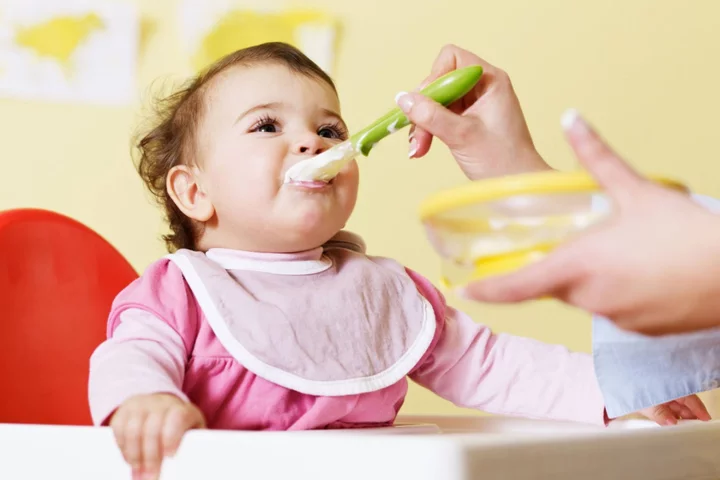
Baby food and drink guidelines needed over sugar concerns, say health campaigners
Health campaigners have called for the “overdue” release of new baby food and drink guidelines over concerns about the amount of sugar infants are consuming from popular shop-bought products. Action on Sugar, along with 16 other groups including The Royal College of Paediatrics and Child Health, Obesity Health Alliance, British Dental Association and the World Cancer Research Fund, have signed an open letter to Health Secretary Steve Barclay urging the release of the guidelines to ensure that all food and drink products marketed to babies are nutritionally appropriate. A letter has also been signed by baby food companies Babease, Little Dish and Little Freddie, calling for the release of the guidelines to create a level-playing field. Action on Sugar said many baby food brands were already reducing sugars but there were still products marketed as suitable for infants and young children with unsuitably high levels of sugars. Late last year, Action on Sugar analysed almost 100 baby and toddler breakfast products, finding that all of them included nutrition or health claims on their packaging and 86% used a “no added sugar” or “only naturally occurring sugars” claim, despite many adding sugar in the form of fruit or vegetable juices, concentrates, purees and powders. Earlier last year a British Dental Association (BDA) study of 109 baby pouches aimed at children aged under 12 months found more than a quarter contained more sugar by volume than Coca-Cola, with parents of infants as young as four months being marketed pouches that contained the equivalent of up to 150% of the sugar levels found in the soft drink. A survey of more than 1,000 UK parents with children aged six to 36 months old found 91% supported the Government in taking action to ensure all food and drinks available in the baby aisle were nutritionally appropriate according to NHS recommendations. An unhealthy diet high in saturated fat, salt and sugar and low in fruit and vegetables is the biggest cause of preventable ill health globally Dr Kawther Hashem, campaign lead at Action on Sugar It is recommended that infants under the age of two should avoid sugar-sweetened drinks and food with added sugar. After this, free sugars should provide no more than 5% of their daily energy intake (approximately 14g). Dr Kawther Hashem, campaign lead at Action on Sugar and research fellow at Queen Mary University of London, said: “An unhealthy diet high in saturated fat, salt and sugar and low in fruit and vegetables is the biggest cause of preventable ill health globally. “Given this, all food and drink companies should act responsibly and commit to improving their products as part of Government and NHS guidance and provide peace of mind for parents when buying foods for their young children.” A Department of Health and Social Care spokesman said: “We are developing guidelines for industry to improve the nutritional content of baby food and drink. “More broadly, thanks to our sugar reduction programme, we have delivered dramatic reductions in the amount of sugar in foods eaten by children – including a 14.9% decrease in the sugar content of breakfast cereals and a 13.5% reduction in yogurts and fromage frais.” Censuswide surveyed 1,004 UK parents of children aged six-36 months between November 2-3. Read More Charity boss speaks out over ‘traumatic’ encounter with royal aide Ukraine war’s heaviest fight rages in east - follow live Period advice now being offered by Amazon’s Alexa Male characters in role-playing video games ‘speak twice as much as females’ The staggering spend of wedding guests revealed
2023-05-24 15:16
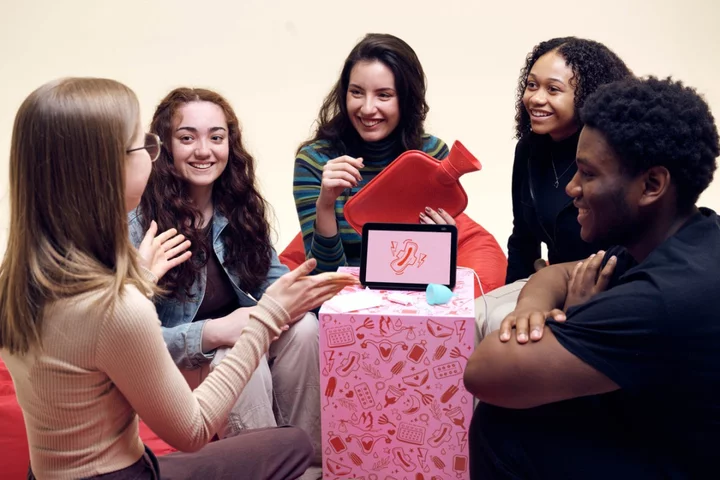
Period advice now being offered by Amazon’s Alexa
Amazon’s Alexa has been trained to offer better advice on periods. Alexa can now answer a series of detailed questions on periods by using information from the Freedom4Girls charity, whose guides have been informed by British teenagers, alongside existing content on the NHS website. Questions it can answer include “Alexa, what is period pain?”, “Alexa, can periods affect my mental health?”, “Alexa, how do you use period pads?” and “Alexa, what is a typical age to start your period?” Other questions for which Alexa has answers include “Alexa, what are reusable period products?”, “Alexa, where can I get free period products?” and “Alexa, are reusable period products cheaper?” Amazon worked with the period poverty charity Freedom4Girls to develop the new experience. Tina Leslie, founder of Freedom4Girls, said: “It’s so important that teenagers and parents alike can communicate with each other properly about periods, which is why we’re happy to be working with Amazon’s Alexa to ensure the correct resources are readily available to more families around the country. “The new features will be useful for anyone – whether you’re embarking on your first menstrual cycle, or if you’re helping someone you know prepare for their experience.” Dennis Stansbury, UK country manager for Alexa, said: “Alexa can now act as a tool to help families navigate challenging conversations around menstruation. “The hope is that having useful and relevant information available on Alexa via voice will encourage an open environment for these discussions.” Censuswide polled 1,007 UK parents with teenagers for new research to support the launch. Almost two-thirds (65%) of those surveyed said having easier access to quality information around periods would make them more comfortable having these types of conversations within their family. While 80% believed having open conversations reduces embarrassment and stigma, some 37% admitted they are too embarrassed at the moment to have open conversations about periods. A further 30% said they struggle to talk about them because they are worried about saying the wrong thing.
2023-05-24 14:25
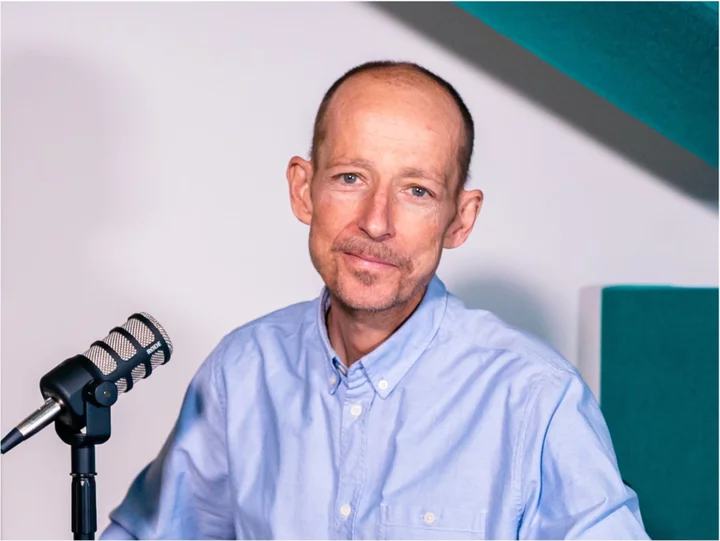
Jonnie Irwin says going public with terminal cancer diagnosis was day he began ‘living again’
Jonnie Irwin has revealed that he felt like he was living a lie before he was honest with the world about his terminal cancer diagnosis. The Escape to the Country presenter, 49, said in November that he “doesn’t know how long” he has left to live, after first being diagnosed with lung cancer in August 2020. Irwin, who also fronted the Channel 4 property programme A Place In The Sun, kept his cancer a secret among close friends and family for two years, before deciding to share the news in November 2022 when his cancer spread to his brain. In a new podcast launched on Wednesday (24 May) titled OneChat, by life insurance company AIG Life, Irwin has revealed that he hated hiding his condition from the world. "The day I came out and told the world I had terminal cancer is the day I started living again, I started being Jonnie Irwin again and I actually feel alive,” Irwin said. The presenter explained that he kept his terminal diagnosis a secret out of fear he would lose work. “The only reason I kept it a secret is because I’ve got to feed my babies, I’ve got pay the bills because when you’ve got cancer, people write you off,” he said in the podcast. Irwin and his wife Jessica have three children; three-year-old son Rex and two-year-old twins Rafa and Cormac. “I had to keep on providing for my family. I was living with such a dark cloud above me... anyone outside of my tight-knit [circle] didn’t know.” This “dark cloud” meant Irwin would hide from photographs and selfies with fans as his appearance started changing after chemotherapy. He said that telling the world was a “massive weight” off of his shoulders. “One of the things that really inspired me to go public was because I will leave a little footprint on this planet because of a TV career but I want to leave a positive footprint but I think I can educate people into living their lives better, then I’ve got something my boys can be proud of.” In March, Irwin gave a health update, telling The Sun: “I’m weak now, fragile and my memory is terrible… but I’m still here.” Read More Couple with 37-year age gap who met when he was 15 have hopes dashed Elle Fanning wows fans with daring cut-out dress at Cannes: ‘My nips could never’ ‘I spent too much money on your wedding’: Musician calls out married friend for flirting with other women
2023-05-24 14:18
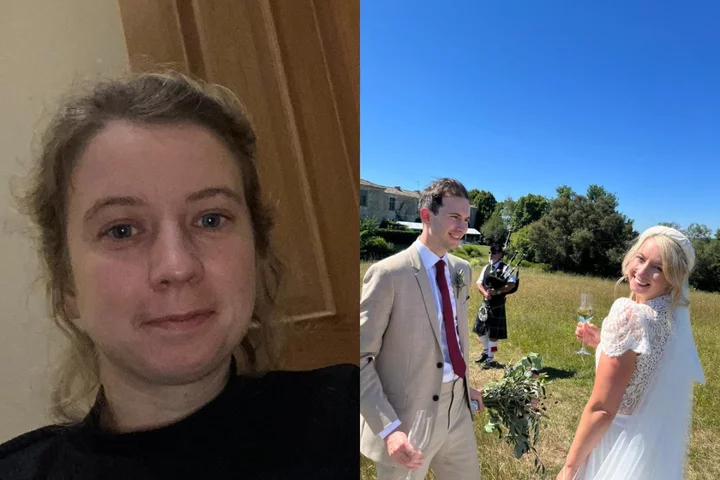
Woman reveals ‘crippling’ condition that almost called off her wedding
A woman who felt she was “trapped in this really dark world” due to her anxiety, causing her to have panic attacks, cancel her hen do, and feel she was “constantly on the verge of having a heart attack”, has said “therapy has allowed (her) to feel like (herself)” again and she has since gone on to marry her best friend who she met at school. Kirsty McKillop, 34, a strategist who lives in Walthamstow, London, said she had experienced anxiety “on and off” throughout her life, but it became all-consuming during the Covid pandemic – particularly after going through a redundancy process at her previous job in PR, which knocked her confidence and made her question her self-worth. She said she felt trapped in this “prison” that she had created in her mind and started “catastrophising” – she thought she would “lose everything in (her) life that she cared about”. “I felt like I was basically being crushed by the dark and being suffocated by it and I couldn’t get out,” she said. Kirsty decided to quit her job to look after her mental health, but then “everything went from bad to worse” as she started to experience debilitating physical symptoms. She would cry every day, vomit, experience heart palpitations, have panic attacks, feel agitated and extremely restless, and lie awake in bed until the morning. At her lowest point, Kirsty said she did not believe that she could get better, and she did not engage in “anything that might help her”. However, with the continued support of her now-husband, Liam, 34, family and friends, she began engaging in therapy from December 2021 – and gradually over time she could “physically feel (her anxiety) lifting”. She has since gone on to get married – something she previously did not think was possible – and go on her honeymoon to South Africa, and she now wishes to give the message that “life without anxiety is possible”. “No matter what level of anxiety you’re feeling, it isn’t something that you have to accept as part of life,” she said. “Whilst it is a natural human response, it’s not something you have to live with, and, going through therapy, it has just completely freed me from those feelings and I’m so much happier.” According to the charity Mind, anxiety is a natural human response when we feel that we are under threat; it can be experienced through our thoughts, feelings, and physical sensations. Kirsty had experienced anxiety at varying stages in her life, but during lockdown, when her job was at risk, her mind was “swamped” with negative and “obsessive” thoughts, with everyday places and situations becoming “bleak and scary and threatening”. While Kirsty did not lose her job, the redundancy process knocked her confidence, and her heightened emotions quickly spiralled into physical symptoms of anxiety. She felt she was in “this constant state of panic” and started “overthinking everything”. “I had really irrational thoughts that I was going to lose everything in my life that I cared about because I was not able to function day to day,” she said. “I think, eventually, it did turn into depression, and then I had quite intrusive thoughts around not wanting to wake up if I did get to sleep. “Not being able to sleep, not being able to eat, being sick, crying, feeling like I was having a heart attack, and feeling terrified of everything was really scary.” Kirsty would lie in bed and try to “disassociate” from her anxiety, but her intrusive thoughts just kept “swirling around in her head”. She then decided to quit her job in September 2021 “to give her the headspace” she felt she needed, but the lack of structure and routine in her life only made her anxiety worse. “It had taken over my head so much that I could not think rationally – everything was like, I’m worried about holding down a job, therefore, I’m not going to be able to pay the mortgage, therefore, I’m going to lose the house, therefore, I’m going to lose my husband and all my friends, and I’m going to end up with nothing,” she explained. “Despite having incredibly supportive friends who would come and just be with me for hours, I still had that fear.” Kirsty remembers a specific conversation where her parents and her then-fiance were discussing the wedding, and she thought: “This is ridiculous, there’s no way I’m going to get married in this state.” By this point, she had started losing consciousness during the day and blacking out, and she had to cancel her hen do. In November 2021, after moving back to her home town in Yorkshire, Kirsty’s family and friends encouraged her to seek professional support, as she was “stuck, trapped, in this completely different place”. Kirsty’s loved ones had looked after her throughout this period and previously suggested she seek help, but she was not willing to engage as she thought “it’s not going to make a difference”. She then started speaking to a therapist who was right for her in December 2021, and Kirsty said she was “pulled out of this horrible world”. Through having sessions once or twice a week, and with cognitive behavioural therapy (CBT), Kirsty said she felt she was “becoming much more rational” as she started to “challenge” her thoughts. The CBT focused on thinking about the facts, rather than “the feelings and the catastrophising” she had been experiencing, to try to “break the cycles of negative thinking”. She said: “When that feeling starts to lift, you think, I can get better, and I want to get better. “It’s not about fighting those thoughts, but accepting them and recognising they’re not facts.” By February 2022, Kirsty started to feel like herself again – she stopped being sick, no longer had panic attacks, and was able to sleep. In April, she started a new job as a strategist, which she now loves, and in July she married Liam and had “an amazing day”. Looking back now, Kirsty said she “dreads to think where she would have been” if she did not start having therapy, and she is beyond grateful for the support she has received from her family and friends. She does not want anyone else to go through the “absolute hell” she has, and wants to encourage more open dialogue and acceptance around mental health and anxiety, as she believes it “shouldn’t define you”. “Anxiety is a natural response, but when it gets to the point where you’re having intrusive thoughts, or it’s affecting you physically, or it’s stopping you from doing things, that’s when it’s not normal and you shouldn’t accept it,” Kirsty explained. “It’s not a state of well or unwell, it’s a state of always making sure you’re looking after yourself because life is always going to throw different challenges at you.” She added: “I enjoy life so much more without letting anxious thoughts spoil my day-to-day life… and therapy has just allowed me to feel like myself and enjoy being myself.” Kirsty is one of many who have offered quotes to inform and create a striking collection of AI art to shine a light on anxiety symptoms. The artwork, from the British Association for Counselling and Psychotherapy (BACP), has been installed outside London Waterloo – for more information, visit www.bacp.co.uk/anxietyis. Read More I was a child with mental health problems. Nothing excuses the way I was treated Mum suffered panic attacks for 30 years due to unusual phobia ‘I spent too much money on your wedding’: Musician calls out married friend for flirting with other women Charity boss speaks out over ‘traumatic’ encounter with royal aide Ukraine war’s heaviest fight rages in east - follow live
2023-05-23 19:49
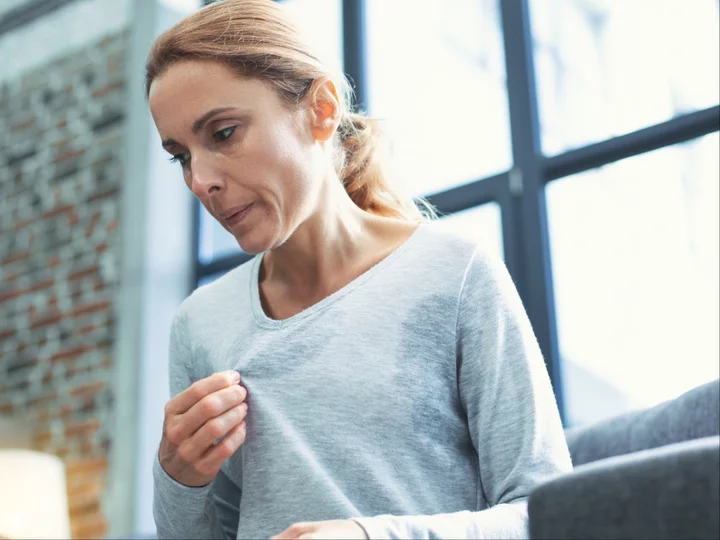
What is fezolinetant? The non-hormonal menopause treatment drug explained
The menopause treatment fezolinetant has been predicted as a “gamechanger” by experts for thousands of women who suffer from hot flushes. The drug, which is the first non-hormonal menopause treatment, was recently approved by America’s FDA. Experts are predicting it could be transformative for women for whom hormone replacement drugs (HRT) are not suitable. The drug was licensed in the US on 12 May and could be approved for use in the UK by the end of the year. According to a British Menopause Society survey, 79 per cent of women aged 45 to 65 experienced hot flushes as a result of their menopause transition, while 10 to 20 per cent describe the hot flushes as “near intolerable”. Here’s everything you need to know about fezolinetant: What is it used to treat? It works to target the menopause symptom of hot flushes. The drug that has been approved by the FDA is made by pharmaceutical company Astella, which advises patients to take one 45-milligram of its VEZOAH (fezolinetant) pill orally, once a day. A large clinical trial of fezolinetant published earlier this year revealed that, after 12 weeks of use, it reduced the frequency of hot flushes by about 60 per cent in women with moderate or severe symptoms, in comparison to a 45 per cent reduction in those who received a placebo. Women involved in the trial also said the drug reduced the severity of hot flushes and improved the quality of their sleep. How does it work? It works by blocking a brain protein called neurokinin-3, which plays a unique role in regulating body temperature in menopausal women. Respondents of the trial have said that the effects of the drug was experienced after taking the first tablet. By comparison, HRT, taken to alleviate menopausal symptoms, replaces the oestrogen that you lose during the menopause transition, either alone or in combination with a progestogen What are the side effects? According to the FDA, the most common side effects are abdominal pain, diarrhoea, insomnia, back pain, hot flush and elevated hepatic transaminases. What have experts said about it? “This is going to be a completely blockbuster drug,” said Prof Waljit Dhillo, an endocrinologist at Imperial College London who led a trial for the drug in 2017 toldThe Guardian. “It’s like a switch. Within a day or two the flushes go away. It’s unbelievable how well these drugs work. It’s going to be completely game changing for a lot of women.” Read More Adenomyosis: 5 things you need to know about the ‘evil twin sister’ of endometriosis ‘Suddenly, I saw Dad again’: The radical technology helping those living with dementia Naga Munchetty reveals womb condition adenomyosis: ‘I live every day on painkillers’
2023-05-22 21:29
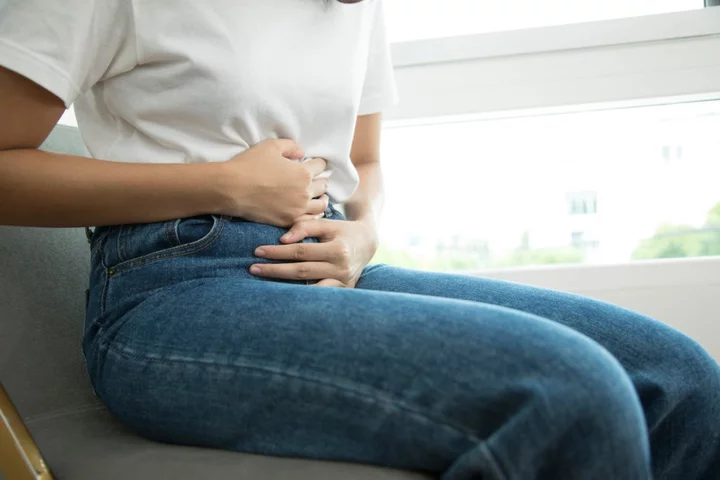
Adenomyosis: 5 things you need to know about the ‘evil twin sister’ of endometriosis
Despite increasing public awareness of endometriosis, with celebrity figureheads including Lena Dunham and Molly Mae, the condition’s ‘evil twin sister’, adenomyosis, remains neglected. While the NHS has an entire webpage which explains what endometriosis is, there is currently no equivalent for its sister condition. Read on for five things you should know. It’s not the same as endometriosis Both endometriosis and adenomyosis occur when the lining of the uterus (known as the endometrium) grows out of place, but there are major differences between the two. In endometriosis, the rogue tissue invades areas outside of the uterus. While the extent of the growth varies from patient to patient, it can affect areas such as the bladder, bowel, ovaries, and even the lungs. Adenomyosis, on the other hand, causes the rogue tissue to bury inside the muscular wall of the uterus. It’s possible to suffer from both conditions at the same time. Symptoms include bloating, heavy periods, and pelvic pain Thanks to the invasive endometrial growth, adenomyosis is characterised by an enlarged uterus. During menstruation, the embedded tissue swells and bleeds, typically causing a variety of symptoms (although some women are asymptomatic). According to a patient leaflet published by University College Hospital, sufferers commonly have painful and irregular periods, with more than half experiencing heavy bleeding. Chronic pre-menstrual pain, and feelings of heaviness and discomfort in the pelvis are among other possible symptoms. Less frequently, adenomyosis can cause bloating, pain during intercourse, and pain related to bowel movements. All symptoms should stop after the menopause. It affects 1 in 10 women The condition is believed to affect 10 per cent of women in the UK. That makes it just as prevalent as endometriosis, although it’s more common in women between the ages of 40-50, and those who have been pregnant before. While the cause of the condition is not known, UCH says that “genetics and some hormones may play a role”. In terms of long-term effects, the North Bristol NHS trust says that adenomyosis does not appear to decrease the chance of pregnancy, however it has been linked to an increased risk of miscarriage and premature birth. Treatment options are limited For women with mild symptoms, trying to get pregnant, or nearing menopause, the North Bristol trust says that treatment may not be necessary, but for those seeking relief from symptoms, it recommends medication to reduce pain and bleeding, and hormonal interventions such as the contraceptive pill. The only “cure” is a surgical procedure involving the removal of the womb (hysterectomy), although this is a last resort intervention. The Bristol-based trust also offers an alternative surgery which involves blocking the blood supply to the endometrial growth, forcing it to shrink, but neither procedure is advisable for women who want to get pregnant in the future. It can take years to diagnose The condition is typically diagnosed using MRI and ultrasound scans, but the NHS says that adenomyosis can take “a long time, even years, to diagnose” because “symptoms and severity can vary between women”. The frequent dismissal of women’s gynaecological symptoms means that signs of adenomyosis may be conflated with ‘normal’ menstruation, or even other conditions such as endometriosis. Anecdotal reports of sufferers suggest that misdiagnosis is common. Gabrielle Union, one of the only celebrities to have publicly identified as having the condition, suspects her condition went undiagnosed for years. Speaking at a conference in 2019, Union explained: “The gag is I had [adenomyosis] in my early twenties, and instead of someone diagnosing me they were like ‘Oh you have periods that last nine or 10 days and you’re bleeding through overnight pads? Not a mere inconvenience... perhaps there’s something more there.’” Earlier this year, the charity Tommy’s reported that the condition might be “underdiagnosed” after a review of existing studies found that “mild” cases could be missed by clinicians using current diagnostic methods. “There should be training for clinicians and sonographers to diagnose adenomyosis using a standardised criteria,” said Dr Ishita Mishra, leader of the review. “Being able to identify this condition using a uniform set of criteria would then help give us a true picture of the numbers affected, and better understanding of the impact of this condition,” Mishra explained. If you have any health concerns, you should always contact your GP in the first instance. There is also information available via NHS Scotland or Endometriosis UK. Read More Lena Dunham marks five years of sobriety: ‘Happiest of my time on earth’ ‘Some days things just do not work’: What happens when your smear test doesn’t go smoothly? Woman’s warning after terminal cancer mistaken for heavy periods 5 things you need to know about adenomyosis, the ‘evil twin sister’ of endometriosis Woman’s warning after lip filler left her unable to close mouth ‘Suddenly, I saw Dad again’: The radical tech helping those living with dementia
2023-05-22 19:45
